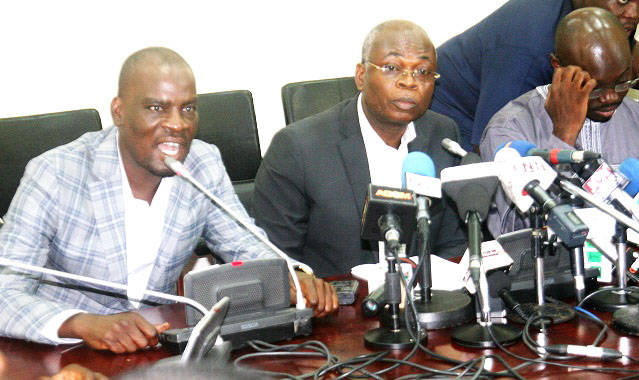Minority MPs
The Minority Caucus in Parliament is plotting the removal of the Attorney General and Minister of Justice, Godfred Yeboah Dame from office.
According to the Minority, the Attorney General must go for disobeying orders to admit the 499 aggrieved law students.
They have therefore filed a motion seeking the removal from office of the Attorney General, because he refused to kowtow to the House’s resolution to the General Legal Council (GLC) to admit the aggrieved 499 law students.
Last week, a bipartisan resolution was passed after the Deputy Majority Leader, Alexander Afenyo-Markin, and the Deputy Minority Leader, James Klutse Avedzi, made a case for it by placing a compulsion on the Attorney General and Minister of Justice to see to it that the GLC enforces the resolution.
However, in response, Lawyer Dame told Parliament it does not have the power to direct him to enforce the resolution.
He stated that the directive has no locus, explaining that “We do not want to get to contempt of Parliament issues. Whilst recognising the general legislative powers of Parliament in Ghana, except as have been circumscribed by the constitution, I am constrained to advise that Parliament is devoid of a power, through the use of parliamentary resolutions, to control the process of admission into the Ghana School of Law,” said the Attorney General in his response.
“The mode of exercising legislative power enshrined in Article 106 of the constitution does not admit of resolutions. In accordance with Section 13(1)(e) and (f) of the Legal Profession Act 1960 (Act 32), the power to regulate admission of students to pursue courses of instruction leading to qualification as lawyers and to hold examinations which may include preliminary, intermediate and final examinations has been vested in the General Legal Council.”
Few days after the response from the Attorney General, the Minority Chief Whip, Mohammed-Mubarak Muntaka, on Tuesday in a memorandum addressed to the Speaker stated that the Attorney General has impugned the “image and integrity” of the House by refusing to carry out the orders.
Censure Of Votes Against Ministers Of State
According to Article 82 of the constitution, a two-thirds majority of Parliament is needed to pass any vote of censure against Ministers of State after the motion has been debated within 14 days upon receipt of the motion by the Speaker of Parliament.
82 (1) Parliament may, by a resolution supported by the votes of not less than two-thirds of all the members of Parliament, pass a vote of censure on a Minister of State.
(2) A motion for the resolution referred to in clause (1) of this Article shall not be moved in Parliament unless-
(a) seven days’ notice has been given of the motion; and
(b) the notice for the motion has been signed by not less than one-third of all the members of Parliament;
(3) The motion shall be debated in
Parliament within fourteen days after the receipt by the Speaker of the notice for the motion
(4) A Minister of State in respect of whom a vote of censure is debated under clause (3) of this article is entitled, during the debate, to be heard in his defence.
(5) Where a vote of censure is passed against a Minister under this article, the President may, unless the Minister resigns his office, revoke his appointment as a Minister.
(6) For the avoidance of doubt, this article applies to a deputy minister as it applies to a Minister of state.
By Vincent Kubi


